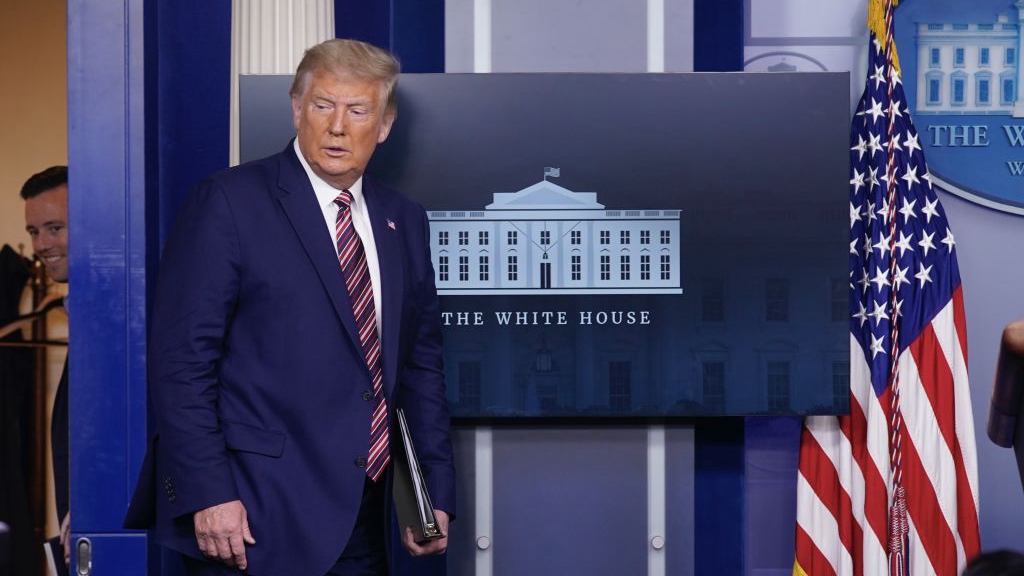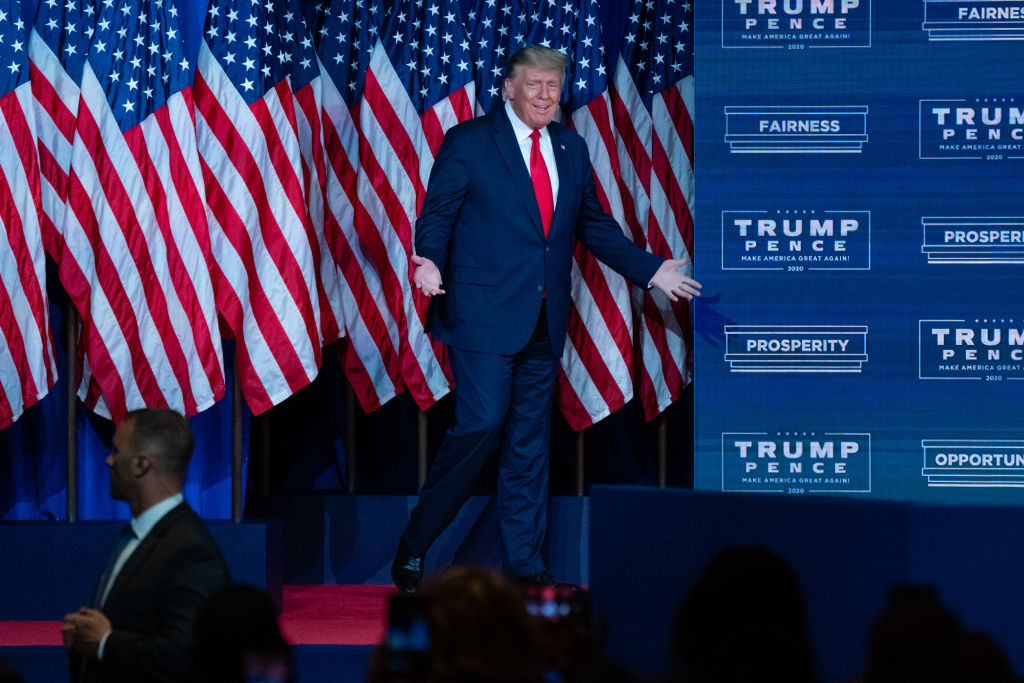
U.S. President Donald Trump attends a news conference in the James S. Brady Press Briefing Room at the White House in Washington, D.C., U.S., September 27, 2020. /Getty
U.S. President Donald Trump attends a news conference in the James S. Brady Press Briefing Room at the White House in Washington, D.C., U.S., September 27, 2020. /Getty
Editor's note: Hannan Hussain is an assistant researcher at the Islamabad Policy Research Institute (IPRI), and an author. The article reflects the author's opinions, and not necessarily the views of CGTN.
On September 27, The New York Times released a devastating account of President Trump's income tax records, amounting to only 750 U.S. dollars in the year of his presidential victory. The review stresses that the president struggled to pay a single dollar in income tax during 10 of his past 15 years, and continued to lock horns with the U.S. Internal Revenue Service over a decades-long audit battle.
The expose, built on tax return data that is tied to both Trump and his broader business empire, is bound to be succeeded by a series of additional articles in the coming weeks. "Mr. Trump has been more successful playing a business mogul than being one in real life," states the report. The president's repeated insistence to keep his tax returns "private" is suddenly deprived of a plausible defense.
The report makes a significant distinction between Mr. Trump's questionable tax return details, and his annual financial disclosures as the president of the United States. More than once, Mr. Trump has referred to the latter because these annual financial disclosures report revenue, not profit.
For instance, reviewed tax records suggest that in 2018, some 47 million U.S. dollars in losses were not explained in accordance with almost 435 million U.S. dollars in publicly reported revenue. This algorithm has enabled Mr. Trump to pump more money into his personal businesses than he is able to extract as legitimately taxable income.
To further illustrate this navigation, consider his Bedminster golf club in New Jersey – a venue that clocked fivefold increases in general and administrative expenses in the space of just a year, yet denied any elaboration in his official returns. The logic carries on.
Interestingly, Mr. Trump's monumental disregard for U.S. tax filings and proportional returns demonstrates the broader challenge faced by U.S. federal appeals court judges in recent weeks. At a hearing on Friday, U.S. Circuit Judge Robert Katzmann blasted Mr. Trump's lawyer William Consovoy for attempting to block New York prosecutors from acquiring the president's tax filings and associated financials.
Adding to the circumvention is Mr. Trump's stock insistence: U.S. prosecutors are leading a coordinated campaign to harass me.
In reality, the president's shady tax return narrative has been investigated in connection to a criminal probe for more than two years.
The Times report extends unprecedented scrutiny to another aspect of the president's tax avoidance saga: financial cover-ups in the lead up to his 2016 election victory. While Mr. Trump billed himself as an impressively qualified candidate based on self-proclaimed business successes, his accountants were preparing their own fine-print for his 2014 tax returns: tabulating profits and losses, but zero in payable income tax.

U.S. President Donald Trump walks on stage during a campaign event in Atlanta, Georgia, U.S., September 25, 2020. /Getty Images
U.S. President Donald Trump walks on stage during a campaign event in Atlanta, Georgia, U.S., September 25, 2020. /Getty Images
Through similar maneuvers, Mr. Trump was able to evade almost any tax on some 604 million U.S. dollars in net income accumulated throughout 2018. His approach to accomplishing this goal, as documented by The Times, was largely by reporting losses from his personal businesses, increasing the prospect of pardon vis-à-vis federal income tax payment compulsions.
In the context of the November election buildup, Mr. Trump's tax failings are likely to empower Democrats – at least rhetorically – and push them to measure presidential credibility against legal compliance.
One of the foremost implications of The Times' tax exposure is that it limits Mr. Trump's ability to market his administration's 2017 tax law continuation as a campaign prize. The legislation lowered taxes on businesses and individuals at the expense of increased budget deficits.
Campaign advocacy for the tax law, therefore, could propel Democrats to first double-down on Mr. Trump's own tax avoidance, especially when the president falls some 400 million U.S. dollars short in combined federal income tax payments for two decades, in contrast to a very wealthy American's annual average.
Second, the revelations successfully weaken Mr. Trump's euphemism of "personal taxes" to sidestep public tax scrutiny during his campaign. Back in July, the landmark Supreme Court ruling Trump v. Vance partly enabled the president to keep his tax returns hidden until after the election, based on his newfound potential to engage self-appointed federal judges in matters relating to financial disclosures.
That position has been dealt a deathblow by the bombshell report, which links his income tax shortcomings to hundreds of millions of dollars in loans that are soon coming due. This takes the sheen off Mr. Trump's "thriving business mogul" appeal among blue collar voters – one which he exercised disproportionately during his 2016 campaign to pin hopes on America's economic resurgence.
For Biden, the tax exposure couldn't have arrived at a better time. It is perfectly timed leverage for Tuesday's presidential debate face-off, where he can delve deep into Mr. Trump's wide-ranging tax return discrepancies, and contrast it with his campaign's message for the benefit of decisive working class voters.
The specificity of the tax avoidance report also limits the scope for Mr. Trump to deflect blame on foreign adversaries, who appear to have provided the president with more money than previously known.
If played right, Biden can also reconstruct a key campaign message that Trump has never considered in full until now: the president has been lying to his working-class supporters.
(If you want to contribute and have specific expertise, please contact us at opinions@cgtn.com.)